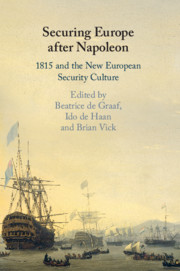Book contents
- Securing Europe after Napoleon
- Securing Europe after Napoleon
- Copyright page
- Contents
- Contributors
- Vienna 1815
- Part I Conceptualisations
- Part II Institutions and Interests
- 4 The Central Commission for the Navigation of the Rhine
- 5 From the Balance of Power to a Balance of Diplomacy?
- 6 The London Ambassadors’ Conferences and Beyond
- 7 The Allied Machine
- 8 The German Confederation
- Part III Threats
- Part IV Agents and Practices
- Index
6 - The London Ambassadors’ Conferences and Beyond
Abolition, Barbary Corsairs and Multilateral Security in the Congress of Vienna System
from Part II - Institutions and Interests
Published online by Cambridge University Press: 25 January 2019
- Securing Europe after Napoleon
- Securing Europe after Napoleon
- Copyright page
- Contents
- Contributors
- Vienna 1815
- Part I Conceptualisations
- Part II Institutions and Interests
- 4 The Central Commission for the Navigation of the Rhine
- 5 From the Balance of Power to a Balance of Diplomacy?
- 6 The London Ambassadors’ Conferences and Beyond
- 7 The Allied Machine
- 8 The German Confederation
- Part III Threats
- Part IV Agents and Practices
- Index
Summary
Ambassadorial conferences formed a primary mechanism of the Vienna system of international relations and of the related European security culture that emerged after 1815. These gatherings offered more flexible opportunities for multilateral consultation and negotiation than did the rarer congress summit meetings. The London conferences of 1816–19 were the first to be planned, as part of British Foreign Secretary Castlereagh's efforts to internationalise abolition of the African slave trade, and they ultimately also took up interdiction of the Barbary corsairs of North Africa. The conferences established connections between these issues that are crucial to understanding European policies toward both abolition and the corsairs, and which reveal how these questions were matters of European – and African – security as well as of humanitarian intervention. As the Vienna settlement extended beyond Europe into the Atlantic and Islamic worlds, the projection of European power overseas to protect security of persons and property could at the same time bring violence in its wake.
Keywords
- Type
- Chapter
- Information
- Securing Europe after Napoleon1815 and the New European Security Culture, pp. 114 - 129Publisher: Cambridge University PressPrint publication year: 2019
- 1
- Cited by

